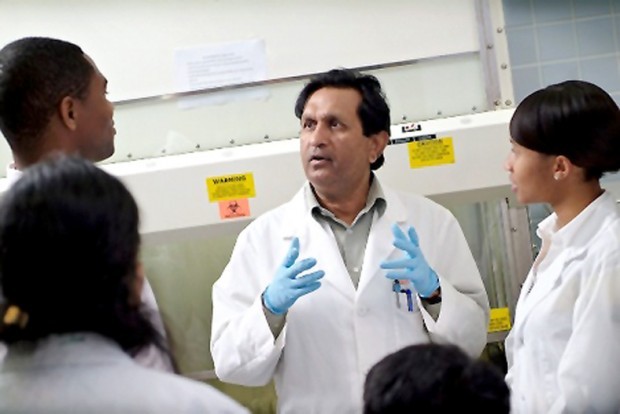COVID-19: How to wash your hands
By: TYRA J. RYAN
Mar 28, 2020

Dr. Omar Bagasra, center, is founder and director of the South Carolina Center of Biotechnology at Claflin University.
People all around the world are being negatively affected by the coronavirus COVID-19 pandemic.
Dr. Omar Bagasra, Claflin University biology professor and director of the South Carolina Center of Biotechnology, has published helpful tips about stopping the spread of COVID-19.
His advice is expert.
Bagasra was a professor at Hahnemann University and Thomas Jefferson University in Philadelphia before coming to Claflin. He has served as director of the Molecular Retrovirology Laboratories and the section chief of molecular diagnostics of the Center for the Study of Human Viruses, as well as a professor of medicine. He is the author of over 200 scientific articles, books and chapters. His research interests have been associated with the study of viruses such as HIV and AIDS.
Bagasra said just washing your hands does not do the job. Washing must be done the proper way to remove the virus. He has made a video showing how a surgeon cleans his/her hands before putting on rubber gloves. The link is: https://youtu.be/pBJuugrqFww
“Hand washing is a science, not an art. A 20-second handwashing does not mean you washed the virus out. If you look at your beautiful hands right now, you will see five fingers, palm and nails. The nails are very important. If you look at them carefully, most of the dirt is under your nail bed,” Bagasra said in a column first published in The Times and Democrat of Orangeburg.
“This is the place COVID-19 may be hiding. If you have plastic nails, large glued nails, take them out now. Trim nails and making sure children’s nails are trimmed down as well. Wash carefully under your nail beds, using the nails from both hands.”
Beyond washing hands, people want to know how to stop the spread of this life-altering virus since the growth rate is so rapid. COVID-19 has affected nearly every country in the world, taking the lives of thousands.
“We are fixated on cleaning surfaces and cleaning and sanitizing our hands, constantly. The recent research, carried out by the CDC (Centers for Disease Control), has shown that COVID-19 was most stable on plastic and stainless steel and viable virus could be detected up to 72 hours post-application, though the virus titer was greatly reduced after 72 hours, stainless steel after 48 hours,” Bagasra said.
“No viable virus could be measured after four hours on copper surfaces and after 24 hours on cardboard. Most importantly, the aerosolized virus survived around three hours in the air tested by the researchers,” Bagasra said.
Social distancing is one of the best prevention strategies.
“Avoid going out to the grocery store or other indoor areas where you are likely to encounter other people at a close distance and touch surfaces previously touched by others, unless you really need something,” Bagasra said.
Throughout this pandemic, it is important to know what can be done to assist others.
“This is one of those times in our lives that we need to put selfishness aside,” Bagasra said. “So if you see a person is infected and suffering from COVID-19 infection, it is the time to shed all the prejudices and fear of the virus.
“Protect yourself with gloves and mask but assist young or old with food, nourishment and all the support you can provide. Adorn the garment of Jesus, care for them like he did for the lepers and the blind. This is the time to emulate the kindness and love for the others who need you. The elderly are more vulnerable but young ones (between 18-30 years old) are not immune to the virus. Check in on older neighbors and friends, preferably by phone,” Bagasra said.
“The media have over emphasized the vulnerability of the elderly, people with diabetes and low immunity (i.e. (HIV-infected, heart illness, etc.). We need to understand that young and robust folks are not immune to COVID-19 and can still develop complications and severe respiratory illness.”